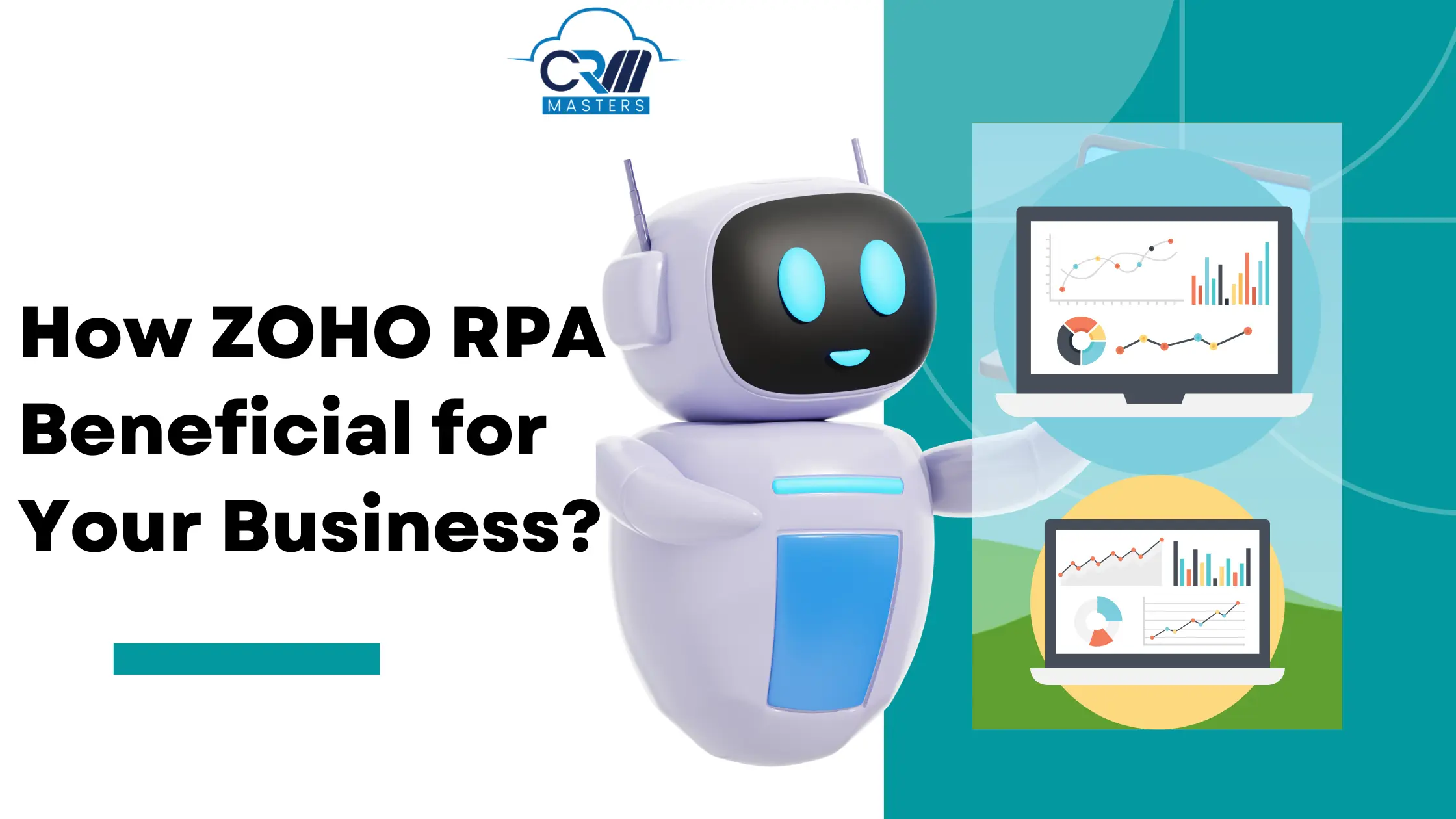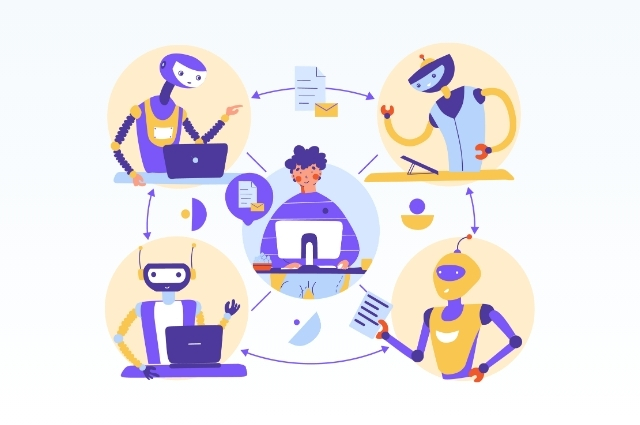
All about Zoho RPA: Features, Benefits and Examples
Robotic Process Automation (RPA) revolutionizes how organizations handle repetitive and rule-based processes. Zoho RPA stands out for its intuitive design, scalability, and seamless integration capabilities, making it one of the leading solutions in this domain. Designed to simplify workflows and enhance productivity, Zoho RPA enables businesses to automate tasks with minimal coding effort, making automation accessible to teams of all sizes.
This blog helps you to learn about Zoho RPA’s key features, benefits, and how it empowers organizations to optimize their operations and achieve measurable outcomes.
What is Zoho RPA?
Zoho RPA is a software solution for robotic process automation that streamlines large-scale repetitive tasks, linking cloud-based and traditional systems to enhance efficiency. It features an integrated recorder that monitors and reproduces your actions across different platforms.
Key Features of Zoho RPA
1. Windows Automation
Tasks involving Windows programs like Adobe Acrobat, Microsoft Outlook, and custom desktop software can be automated with Zoho RPA bots. Automating Windows processes is advantageous for managing legacy applications or workflows where APIs may not exist. You can set up bots to manage mouse and keyboard actions (clicking, typing, scrolling) and handle pop-up windows, alerts, and other operating system-level notifications
2. Web Automation

Web automation refers to automating web browsers’ activities, including completing forms, gathering data, clicking on links, and moving through websites. Zoho RPA is capable of simulating human actions on web pages, managing tasks such as inputting data into web applications, retrieving information from online sources, or streamlining online shopping and order management. This type of automation is beneficial for tasks that necessitate regular engagement with web-based systems, encompassing CRM, cloud services, and e-commerce platforms.
3. Excel Automation
Zoho RPA’s Excel automation makes automating tedious Microsoft Excel tasks easier. These include creating reports, formatting, data entry, data manipulation, and intricate computations. With the help of bots you can run macros and open, edit and save files. Excel automation benefits companies that use spreadsheets extensively for data analysis, financial reporting, and operations.
4. 900+ cloud app integrations
They offer pre-configured integration over 900 cloud applications like with Zoho Flow, Zoho People allowing you to automate processes across many departments—from HR and finance to marketing and customer support. For scenarios where out-of-the-box integrations fall short, Zoho RPA provides the flexibility to create custom automation logic through custom functions using Deluge.
5. Files and Folder Automation
The main goal of file and folder automation is to automate file management tasks, including renaming, copying, moving, and organizing files and folders. Zoho RPA can automate the process of uploading documents from a local file system to cloud storage by archiving older files, choosing the necessary files from a folder, or initiating actions based on file operations. Document management is streamlined by this automation, increasing productivity and lowering human error.
Examples of Automation with Zoho RPA
1. Customer Onboarding and KYC in BFSI
Customer information can be automatically retrieved from forms using Zoho RPA, which can validate documents, cross-check them against databases, and update relevant records to ensure regulatory compliance. This accelerates the onboarding process and significantly reduces manual effort.
2. IT system health monitoring and maintenance
RPA bots can monitor IT systems for performance problems (e.g., perform basic troubleshooting, create alerts for issues, and measure CPU and memory usage. With Zoho RPA, you can automate patch management and schedule backups as well. In addition to ensuring that systems adhere to security standards and producing performance reports, the bots can also set off alerts if they do not.
3. Customer Onboarding and KYC in BFSI
Zoho RPA is capable of validating documents, cross-referencing them with databases, automatically extracting customer information from forms, and updating relevant records to ensure compliance with regulations. As a result, the onboarding process is sped up, and manual labor is greatly decreased.
4. Healthcare Claims Processing and Billing
RPA bots can access data sources such as patient databases and healthcare management systems, check policy coverage, confirm patient eligibility, and send notifications of approval or rejection. Additionally, they can send bills to clients or insurance companies and update insurance databases.
How to Start Zoho RPA for your Business Success
1. To access the RPA platform, create an account on Zoho’s website. Start with a free trial account and explore its features before buying a subscription.
2. Use the drag-and-drop workflow builder to design your automation process. Select the actions, triggers, and conditions needed to build a smooth workflow.
3. After successful testing, deploy the bot to run autonomously or on demand.
4. The monitoring dashboard allows you to track your bot’s performance. Based on the insights, you can fine-tune and optimize your workflows to improve efficiency.
Why Zoho RPA is better than other automation Methods?
Zoho RPA has unique benefits that make it essential for many businesses, even though many automation technologies are on the market.
1. Non-intrusive integration
One of Zoho’s greatest advantages is its ability to automate procedures without requiring significant integration or modification to current systems or applications. RPA functions at the level of the user interface (UI), enabling it to function with any application, be it a web application, a legacy system, or a contemporary enterprise tool, without necessitating substantial reconfiguration or access to source code.
2. Low Code Development

Zoho RPA features a low-code development environment and a built-in recorder. This makes it usable by a wider variety of users, such as citizen developers or business analysts who might lack in-depth technical knowledge. With its user-friendly drag-and-drop interface and integrated tasks, users can create automation workflows without having to write complicated code.
3. Perfect Auditability
RPA bots provide improved process traceability and auditability by adhering to predetermined rules and recording each action. This is especially helpful for sectors like finance, healthcare, and pharmaceuticals with strict compliance requirements. Zoho RPA’s comprehensive logs make it simple to monitor and audit operations, and it can guarantee that procedures are carried out in compliance with legal requirements.
Conclusion
Zoho RPA is more than just an automation tool—it is a strategic enabler for innovation and efficiency. Businesses can redirect their focus toward value-driven initiatives and strategic growth by automating mundane tasks. Whether enhancing accuracy, improving operational speed, or enabling better resource utilization, Zoho RPA delivers tangible benefits across industries. As automation continues to evolve, adopting solutions like Zoho RPA positions organizations to stay competitive, agile, and prepared for the future.
CRM Master’s is premium Zoho Partner that can help you to integrate Zoho RPA for your business success.












